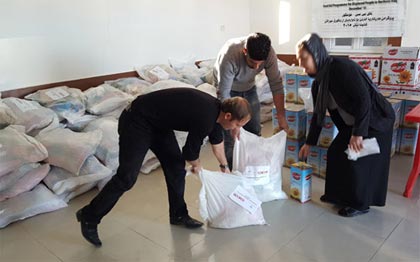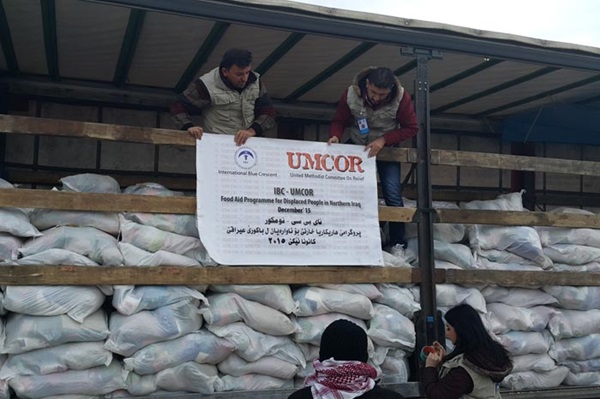The greatest upheaval since World War II continues to push millions of refugees across national borders. But at the Middle East epicenter of the upheaval, in Syria and neighboring Iraq, many of those displaced by conflict remain within their countries' borders, where they suffer the same hardships of homelessness and are in desperate need of help.
In Iraq, some 10 million people require humanitarian aid, and the number is expected to rise this year to at least 12 million, according to the U.N. Office for the Coordination of Humanitarian Affairs (UNOCHA). More than 3.3 million people have been displaced in the country by ongoing — and escalating — conflict.
Nearly half a million internally displaced persons (IDPs) are currently housed in Iraq's northern governorate, or province, of Duhok, in the Iraqi Kurdistan region, where the security situation is relatively safe and the homeless can find refuge.
UMCOR, the United Methodist Committee on Relief, is helping to meet the needs of this uprooted population by combining its efforts with a long-standing partner in the region, the Turkey-based International Blue Crescent (IBC).
"Local economies, infrastructure and services are being severely strained, leaving people extremely vulnerable," said Laurie Felder, executive secretary for UMCOR International Disaster Response.
Felder noted that food security is a critical area of vulnerability. "People are struggling to survive every day," she said.
 |
| With the help of International Blue Crescent workers, a woman picks up UMCOR food packages consisting of sunflower seed oil, an assortment of legumes, pasta, rice, salt, sugar, and wheat flour. |
UMCOR is working with IBC to provide a month's supply of emergency food packages to 865 displaced families, a total of about 5,000 individuals. The packages include sunflower oil, grains, beans and other legumes, such as lentils, plus flour for making bread.
Nalan Üker, program's director for IBC, calculated that more than a fifth of the IDPs in Duhok are minors. And she added: "According to health authorities approximately 1,350 babies are being born every month to internally displaced families in Duhok, and so our project is deliberately designed to meet the needs of these vulnerable groups of children and breastfeeding mothers."
With conflict worsening to the south of Duhok, IBC expects that food security will continue to deteriorate. Supply lines are badly fractured in all governments because of the fighting. Families' purchasing power is down 50 percent, IBC reported, and a standard food basket is now 70 percent more expensive in areas like Duhok than in the capital, Baghdad.
"The most important outcome we hope for from this intervention is that people will be provided with a stable source of nutritious food," Felder said, "and that for at least a month they will be able to sit for a meal and not worry where and when they will get their next."
David Tereshchuk, journalist and media critic who contributes regularly to www.umcor.org.
One of six churchwide Special Sundays with offerings of The United Methodist Church, One Great Hour of Sharing calls United Methodists to share the goodness of life with those who hurt. Your gifts to One Great Hour of Sharing lay the foundation for the United Methodist Committee on Relief (UMCOR) to share God's love with communities everywhere. The special offering underwrites UMCOR's "costs of doing business." This helps UMCOR to keep the promise that 100 percent of any gift to a specific UMCOR project will go toward that project, not administrative costs.
When you give generously on One Great Hour of Sharing, you make a difference in the lives of people who hurt. Give now.





